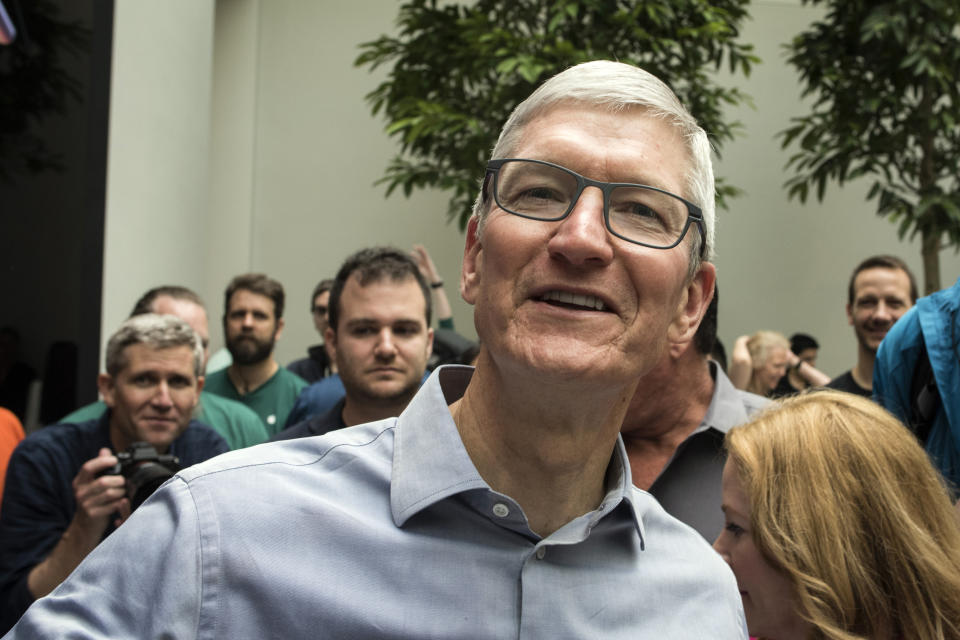Apple has officially gotten itself out of its iPhone trap
For years, Apple's (AAPL) biggest growth driver has been the iPhone. In fact, Apple became so reliant on its smartphone that a small dip in sales could send investors into a frenzy. But following the company's Q3 2019 earnings report on Tuesday, it's clear Apple has learned its future can't rely solely on the iPhone.
For proof of that, look no further than the fact that while iPhone sales slowed in the quarter, the company's revenue was up year-over-year thanks to growth in the tech giant's services, Mac, iPad, and wearables and accessories businesses. In other words, Apple is finally weaning itself off its iPhone dependence.

Services and accessories are catching up
To illustrate that Apple is able to lean on its non-iPhone businesses, let's take a look at the company's Q3 2018 and Q3 2019 revenue breakdown.
Q3 2018
Total revenue: $53.27 billion
iPhone: $29.91 billion
Services: $9.55 billion
Mac: $5.33 billion
iPad: $4.74 billion
Other products (wearables and Home gadgets): $3.74 billion.
Q3 2019
Total revenue: $53.81 billion
iPhone: $25.99 billion
Services: $11.46 billion
Mac: $5.82 billion
iPad: $5.02 billion
Other products (wearables and Home gadgets): $5.53 billion.
The numbers don't lie. The iPhone made up 56% of Apple’s revenue in the third quarter of 2018 but just over 48% of total revenue in the quarter most recently reported. A clear trend is developing, Citi Research's Jim Suva and Asiya Merchant explain in their research note.
"Apple’s wearable, home, and accessory category is larger than iPad sales. This underscores a new theme that is starting to emerge from Apple, which we believe investors are overlooking, and that is the diversity of Apple’s offerings," the pair wrote.
Apple bulls are too high on services and bears focus too much on iPhone sales, Suva and Merchant explain. But the company is really moving the needle across all of its business segments instead of positioning one single unit as its chief breadwinner.
"We believe most are not realizing the diversity of Apple’s offerings," Suva and Merchant wrote, adding that the company will only add to its portfolio via the Apple Card, which is set to launch in August, and the Apple TV+ and Apple Arcade services launching later this fall.
The fall in Apple's iPhone sales has helped to prove the company's other businesses can keep it soaring.
"Phone weakness has helped to magnify the benefit of a broadened portfolio and robust growth in wearables and services and a renaissance in iPad and Mac demand, which valuation is reflecting with [Apple's] shares trading in line with the S&P 500, a prior historical peak," Longbow Research analysts Shawn Harrison and Gausia Chowdhury wrote in their own research note.
This broadening mix of revenue sets Apple to better handle times when iPhone sales fail to impress, such as in Q3, when phone revenue fell just short of expectations. The growth in other segments of the company's business, though, helped push the stock to a high for 2019.
There's still room for doubt
While Apple has certainly shown it can lean on its non-iPhone offerings for strength, there's still some doubt that the company has pushed past its over-reliance on the handset.
The fear is that because Apple's iPhones are the key to connecting users with products like the Apple Watch and AirPods, and services like Apple Music and the App Store, a fall in iPhone sales could hit the company's other segments.
"Non-iPhone hardware revenues have exhibited mid-to-high teens [year-over-year] growth for 3 straight quarters, but we remain dubious that such growth can sustain over a multi-year time frame, especially when wearables/services revenues remain tied to iPhone growth, in our view," Deutsche Bank analysts Jeriel Ong and Ross Seymore wrote in their research note.
But Apple has indicated its install base is continuing to grow despite slowing iPhone growth. The pair say that can be attributed to "a strong secondary iPhone market for refurbished phones, especially in emerging markets," explained Citi's Suva and Merchant.
Apple is also increasingly moving its offerings off of its own products. Apple Music is already available on Android and Windows, and the company recently launched its Apple TV app on smart TVs from Samsung, offer AirPlay 2 support on LG, Vizio, and Sony smart TVs.
Apple's AirPods also work with Android devices, though you're not going to get the same level of functionality. Siri, for instance, won't work with Android devices.
Apple's iPhone sales are likely to remain muted until the company releases its 5G-capable handset, which is rumored to occur in 2020. Though Apple recently purchased Intel's modem business, it's unlikely that those chips will find their way into the 2020 iPhone.
After all, with consumers keeping their phones longer, it only makes sense that they'd hold off until a 5G iPhone is available. But Q3 has proven that Apple can survive without selling a record number of iPhones each quarter. The company is finally free of its iPhone trap.
More from Dan:
Intel beats on top and bottom line, sets $1 billion deal with Apple
Facebook beats Q2 expectations, says FTC has opened an antitrust investigation
Email Daniel Howley at [email protected]; follow him on Twitter at @DanielHowley.
Follow Yahoo Finance on Twitter, Facebook, Instagram, Flipboard, SmartNews, LinkedIn,YouTube, and reddit.
